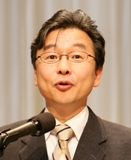��Do Languages Connect People? Language of Daily Life, Language of President Obama and Rare Languages��
March 18, 2009
Mr. Ippei Inoue,
Vice-president of the Archives of the World Language,
Professor of Keio University
 I currently engage in two occupations, one as a scholar of sociolinguistics and the other as a representative for the incorporated NPO ��The Archives of the World Language.�� I also serve as a General Manager for the University athletic swimming club.
I currently engage in two occupations, one as a scholar of sociolinguistics and the other as a representative for the incorporated NPO ��The Archives of the World Language.�� I also serve as a General Manager for the University athletic swimming club.
Meetings of athletic clubs usually start with greetings given by General Managers, who often introduce themselves as ��I am a graduate in the class of 19XX.,�� by referring to their graduation year. I always introduce myself as ��My name is Inoue, born in 1961,�� with the year I was born in. With this information, many seniors come forward in a friendly and relaxed manner, some even pat me on the shoulders, and tell me that I was born in the same year as their sons. This is when I actually realize the ��power carried by languages.�� Language has a function to affect one��s impression on others or to build up relations with others.
People use languages in a strategic manner, so that they can build up personal relationships by telling a certain fact, or try to give a different impression to others by telling the same fact through various ways of expression. Such function languages carry is a good proof that ��language does not consist merely of grammar and vocabulary.��
Languages have the power of defining cultural backgrounds or tacit assumptions, and eventually formulating inter-personal relationships. They also reflect the worldview of the speaker.
I would like to touch upon the language used by the young of today on a day-to-day basis, as an example of language of daily life.
Sociolinguistic studies show that misuse of honorific languages is not restricted to young people. What interests us is the fact that honorific languages reflect the ��attitude on inter-personal relationships�� of the time. The overall trend is that honorific terms expressing relationships of rank and/or seniority are being replaced by expressions previously considered too personal. It is neither new nor surprising that the present elder generation feel uneasy about these changes because successive generations everywhere have always disapproved of ��languages of the young�� corrupting their language.
Young people��s language is ��group-orientated language.�� It functions to strengthen the unity and sense of camaraderie among those who use the same language and exclude the others. While it reinforces inter-personal relationships within the group, it tends to exclude those who do not belong to the same group.
Quite recently, the speech delivery technique of President Obama attracted much attention. It is analyzed that choosing words easy to understand was the crucial element in his success. It is not fair, on the other hand, to make comparison with how the Japanese statesmen deliver their speeches based on the same context. We need to keep in mind that the role and function of each language differs from culture to culture.
Under the slogan of ��from language of daily life to rare languages,�� the Archives of the World Language published ��Collection of Greetings from all over the World,�� which compiles greetings and socializing phrases that we use in our daily lives. When we translate the greeting as ��hello,�� all greetings become the same. But in reality, the word that follows the greeting varies from culture to culture. In the Chinese cultural sphere, they ask ��have you eaten already?�� A certain ethnic group in Africa uses the phrase of ��how did you wake up from your nap?�� as a greeting for the afternoon.
We tend to interpret languages word by word as a dictionary, but language is actually rooted in the habits formed by the culture and mode of communication in each locality. Therefore, in case of the English language, people can share the same language but apply different meanings according to their cultural backgrounds. This is why the plural form of ��World Englishes�� came into common use.
Various kinds of English are emerging all over the world. Many Japanese have started to communicate in English with Asians who are not native speakers of English. In such cases, English can contain different meanings, implications or interpretations through varying prosody or practice of communication.
Languages are intrinsic to people��s history and worldview. Should mankind lose one rare language, a worldview will disappear. I am determined to continue my activities, with the conviction that any language is an irreplaceable cultural heritage.